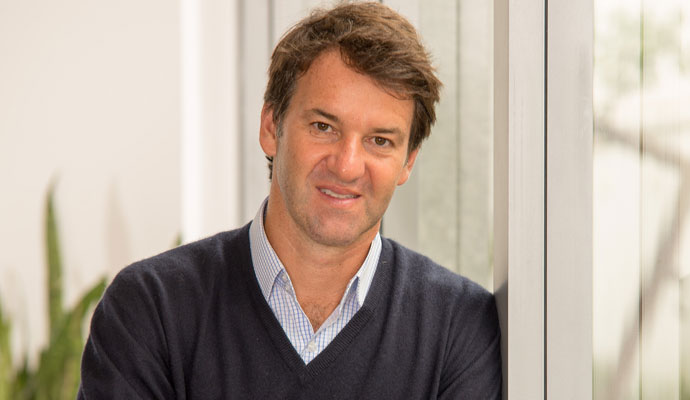Start Small and Think Globally
Brazilian media and private equity leader Eduardo Sirotsky Melzer has a message for high-tech, middle-market companies in emerging economies: This could be their moment.
This interview is part of the Inside the Mind of the CxO series, which explores a wide range of critical decisions faced by chief executives around the world.
One of the perennial challenges for emerging economies is creating a positive climate for growth, one in which companies large and small can find markets inside and outside the country. Eduardo Sirotsky Melzer sees EB Capital — a Brazilian investment firm of which he is the founder and chief executive — as a catalyst for that kind of growth. During the past five years, through private equity in the middle market and two venture capital funds, he has been fostering entrepreneurial startups and helping them gain the managerial maturity they need to succeed in Brazil and around the world.
Melzer is also the chair and CEO of Grupo RBS, one of Brazil’s leading media companies and family-owned businesses. His grandfather, Mauricio Sirotsky Sobrinho, founded Grupo RBS in 1957 in Porto Alegre, the capital of Brazil’s southernmost state, Rio Grande do Sul. Melzer, now 46, began his career as a banker, founded a few small companies in Brazil, and then in 2000 moved to Cambridge, Mass., for an MBA program at Harvard Business School. After graduating and working in the U.S. for two years, he was brought into the family firm; he became CEO in 2012 and chair in 2016.
Grupo RBS is a media conglomerate earning annual revenues in 2017 of about US$500 million to $600 million, or about R$2 billion in Brazilian reais. Its best-known components are the daily newspapers Zero Hora and Diário Gaúcho, and RBS TV, which is the southern affiliate of the giant Brazilian network Rede Globo. The Grupo RBS–owned sports and news station Rádio Gaúcha, with its associated satellite network, is the largest radio chain in Brazil, boasting more than 143 stations in seven states. Grupo RBS also owns enterprises in logistics, book publishing, and agricultural news.
Drawing on what he calls “the entrepreneurial spirit of the Sirotskys,” Melzer founded EB Capital in 2011. EB focuses on building long-term growth equity in middle-market companies (typically a $300 million to $500 million investment per deal), working in close partnership with their management teams. EB deploys its own capital in every deal. Strategy+business met with Melzer in May 2018 in the EB Capital New York offices to discuss his view of business investment as a catalyst for change, and the reasons he focuses on middle-market companies.
S+B: How did your perspective evolve from that of the head of a family-run entertainment and media conglomerate to that of an investor in a broad range of medium-size enterprises?
MELZER: For its entire lifetime of 60 years, Grupo RBS has invested in other Brazilian companies. We believe in Brazil in the long term. Our sweet spot is the middle market, particularly fast-growth entrepreneurial companies. We believe they represent the future of the country. Our goal is to create a new generation of business leaders in Brazil.
Over time, as we have guided the companies we invested in, we have learned the nitty-gritty of their cultures and the details of their operations. We also learned the ways in which M&A can create value — not just by consolidating companies, but by improving the ways they do business. We are not only asset allocators. We work hand in hand with entrepreneurs and business leaders to help them grow their businesses and take them to the next level. This requires much more than the deployment of financial resources. We work close together and bring our 60-plus years of operation expertise and local knowledge.
When I took the reins of RBS in 2012, I remembered some of the stories I had been told about my grandfather. He had started very small; his first channel was a loudspeaker attached to a streetlight in a town square. The company was too small to have core competencies, except for his vision and energy. So he created businesses in a variety of different sectors to gain scale.
RBS had become a major media company, but the media business was changing. Our audience was stable in size, but was migrating to digital platforms. Advertising revenues were in danger. Any company like ours that wanted to survive as a media platform would have to improve the relevance of its news, sports, and entertainment — as we did, in consolidating our online offerings. But it would also have to rethink its role as a catalyst for businesses in different sectors.
Thus, in 2017, we spun off our venture fund and relaunched it as a new, independent investment firm. We knew that by bringing in third-party capital, we could be more efficient at attracting deals and talent. The combination of an independent investment firm and the long-term vision and values of a family business gives us a unique value proposition. Our goal was, and is, to take advantage of opportunities in Brazil.
Essentially, we went back to basics: If a company like ours, operating in a few sectors like entertainment and media, has distinctive skills in logistics, marketing, governance, and financial restructuring, it should be possible to transfer those skills to other industries as well. This contradicted advice I had always heard that you should base your strategy on your core competence. People are told to launch enterprises that are adjacent to something they already do. But that mind-set will never lead [them] to start a truly new business.
S+B: You mentioned that RBS improves the practices of the businesses it invests in. Can you speak more about that?
MELZER: Many middle-market startups have gone rapidly in revenues from zero to about $100 million to $130 million [about R$400 million to $500 million in Brazilian reais]. But they cannot go from there to be a billion-reais company, at least not as they are now. That transition requires the kind of managerial and strategic skills that can handle a much greater level of complexity.
“People are told to launch enterprises that are adjacent to something they already do. But that mind-set will never lead [them] to start a truly new business.”
It’s analogous to the difference between the issues and opportunities that a teenager faces and those faced by an adult. The leaders of a middle-market company need financial resources, of course, but they need much more. They need stronger management support and a credible network. Most of all, they need guidance on many day-to-day operational issues involved with scaling a company: how to deploy warehouses and logistics, create an incentive plan, build an HR function, and so on.
S+B: Aren’t medium-sized companies already dealing with these factors before they get bigger?
MELZER: When they reach a certain level of scale, the competitive landscape changes. The sophistication of the company must change to match. The caliber of the talent these companies need is completely different. Their products must be diversified in different ways. They must source larger quantities from more suppliers. As entrepreneurs, they operated on intuition, gut feeling, and the ability to move past obstacles. They cannot live that way any longer. And they don’t necessarily have the experience they need to grow.
When an investment firm like ours goes to the middle market and just gives cash to a company, [it’s] doing them a disservice. They need support in planning their strategy and execution at the next level, and choosing the right people to help them. We have found this more intensive approach to be very compelling. It is not handled by most investment firms, which don’t necessarily have the time or skills to go into operations. But we can do it, because we are not only finance people ourselves. We come from the operational world, and we hire finance people to work with us.
S+B: What type of companies are the most likely prospects for investment?
MELZER: There are two main criteria to consider. First, the company should be in a high-growth sector. Second, it should need help beyond purely financial resources. It could need processes that others have mastered, or access to experience with the new challenges they are facing. With the right skills, it is often possible to boost a company’s performance in an accelerated way. Sometimes that might involve merging two or three companies to consolidate into a leading position.
Execution is extremely important in deals of that sort. The details of the integration and the management of egos are critical. A deal might bring together three companies that were founded and managed by great entrepreneurs, and now, instead of running their businesses as they have for the last 10 or 12 years, they’re going to form a team with their two toughest competitors. But they realize they have to do this to dominate the sector.
S+B: Are these largely technology startups?
MELZER: Technology is important as a differentiating factor. It makes companies more efficient and better able to serve clients. The fastest-growing companies all understand how to use technology to accelerate their growth.
But they don’t have to be in the technology industry. For instance, we’ve invested in one of the largest global Internet-based wine merchant companies: wine.com.br [based in Serra, a small city northeast of Rio de Janeiro; the company is unrelated to the San Francisco–based retailer wine.com]. In Brazil, per capita consumption of wine has always been relatively low, but right now, it is growing. The company is profiting by making it easier for its customers to be better wine drinkers; by educating them, for instance, on when to drink red or white, or explaining how to have a good experience when inviting friends over. It has instituted a subscription in which every month a customer gets a few bottles, chosen after a survey about their lifestyle. These simple practices can completely change the pattern of wine consumption in a country.
S+B: The growth of wine consumption indicates that the middle class in Brazil is growing, correct?
MELZER: There is a huge correlation with the growth of the middle class. But even when the economy [slows], wine consumption remains resilient. People have less disposable income to travel or do more expensive things, so they buy cosmetics and get wine boxes delivered.
Another example of middle-market companies poised for growth is the Internet providers starting up in Latin America. Internet access has been unaffordable in remote areas. It’s different from the U.S., which already has a vast cable TV network. U.S. companies won’t [gain] much return on investment for fiber-optic to the home. But emerging economies will.
S+B: Do you see companies starting in Latin America and then moving into more of a global or regional focus?
MELZER: One challenge for Brazilian companies is to develop global brands that can succeed in North America, Europe, and Asia. I think it’s partly a mind-set issue. These middle-market companies, in particular, have to have the willingness and energy to think globally. There’s no reason for them to think from a frontier standpoint anymore; consumers in our region, and every region, have a lot of mobility, and they have access to products all over the world. If a customer lives in São Paulo, New York, or Tokyo, it shouldn’t matter. There are a few Brazilian companies that have begun to play a global role, like [cosmetics company] Natura and [private equity firm] 3G Capital — both great companies. I see the middle market as full of fantastic opportunities, opportunities that will help this new business generation adopt a more global vision of the market.
S+B: But you don’t see Grupo RBS, your media group, as potentially global?
MELZER: No, not our core media businesses: There, our strategy is the opposite. We understand how the media industry works, and we believe that the only way to differentiate ourselves is to specialize in local issues. No one knows soccer better than we do in our region. No one knows the Brazilian economy, its politics, its weather forecasts, and the problems on the street better. People see the value in having high-quality entertainment and news with a connection to a specific market. As a viewer, as much as you may be concerned with what’s going on in the world at large, what really matters to you is the talk of the town where you live. If you’re a futbol fan, and I [as a broadcaster] have someone who can tell a story about the World Cup with a proprietary local angle, that gives my channel legitimacy. I know what motivates you, what makes your heart beat in a certain way.
The same is true for our reporting on politics, and particularly the scandals of the last few years. The differentiating factor is the ability to translate local and national and global problems to our specific region. Our journalists live here. It’s “one of us” who’s telling the story. They have credibility.
S+B: Have the scandals — and political conflict, more generally — changed the ways in which people pay attention to the news in Brazil?
MELZER: It’s a turning point for the country. The old, corrupt way of doing business had been going on for generations. Most people didn’t know exactly what was involved, but everyone knew there was something going on. Now there is more transparency. People see that it’s time to clean it all up, and they want to do it right. It gives the country the opportunity to create a new generation of business leadership.
The change also reflects an evolution of society as a whole. Some attitudes — discrimination, ethnic prejudice, gender differentiation — aren’t tolerated as much. Years ago, if you had sexual harassment in a company, no one would talk about it. Also, some leaders took advantage of these broader changes to establish some local turning points. “In my company, we’re changing our practices.” Or, for a judge: “In my jurisdiction, I’m going to enforce the rule of law.” When we boil it down, the root cause is a society willing to change.
And I think this change is a global phenomenon. It’s reflected in all the voting: Brexit, Trump in the U.S., Macron in France. It’s a big inflection point for society as a whole. It’s not a technology disruption; it’s a social disruption. It’s not entirely clear where it’s going, but I think it’s a fantastic moment to position yourself as a business leader. You can either watch or do. It’s a great time to stand up and do something to improve what we have here, in terms of your life, your businesses, and the people you can impact.
S+B: As a decision maker in media, and as the leader of an investment firm, how far ahead do you look? What’s the future time frame that you’re thinking about?
MELZER: I am concerned about five- and 10-year plans. They don’t work. It’s a little bit arrogant to say that you can plan the future. Five years ago, you could never have planned for what has happened since then. The speed of change is without precedent. Having said that, every company needs clear goals about where it wants to be. How you set those goals will vary from one company to the next. Coming from a family business, I believe it’s critical and fundamental to have a long-term view. An enterprise is built step by step by step.
However, your goals must be flexible. One of the most relevant skills for business leaders is the ability to adapt to change and reinvent yourself. No matter how successful you are, if you keep doing what you’re doing, there’s a very high likelihood that you’re going to be displaced.
I see the goals for your business, for society, and for your family as integrated. You affect every other level even in the way you conduct your individual personal and professional life. That’s why, for me, it’s important to have a holistic vision of where you want to get to and how you will get there.




